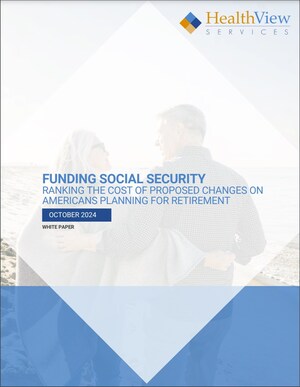Millennials' Social Security Benefits May be Hundreds of Thousands of Dollars Lower than Current Promises
Based on the Social Security Trust Fund's 2035 solvency expectations, HealthView Services' new report highlights the potential impact of lower retirement income from Social Security benefits and what millennials will need to do to close the funding gap
DANVERS, Mass., June 22, 2022 /PRNewswire/ -- Millennials may well lose hundreds of thousands of dollars in Social Security benefits based on the Social Security Administration's projection that, starting in 2035, it will only be able to pay 80% of promised benefits. A new HealthView Services white paper "Social Security Benefits: How Much Should Millennials Expect?" highlights the impact of lower benefits on millennials' retirement plans.
The Social Security Trust Fund report notes that changes will need to be made to increase funding and/or reduce benefits to address solvency issues. Since the oldest millennials will retire eight years after 2035, and demographic changes mean fewer workers will be available to support a greater number of retirees, benefits are likely to be lower for this generation. The new report uses the projected 20% reduction in Social Security as a benchmark for retirement planning data in the report.
Based on this, the paper shows 35-year-old millennials (the midpoint age of this generation) earning between $50,000 and $150,000 would experience a decline in future lifetime benefits of between $365,000 and $675,000. This assumes benefit claims are made at the current full retirement age of 67, the retiree lives to average actuarial longevity, and annual cost-of-living adjustments (COLAs) projected by the SSA.
"Millennials already have low expectations for the role Social Security will play in their retirement plans," said Ron Mastrogiovanni, CEO of HealthView Services. "These benefits will clearly be less valuable to them than past generations. What may be a surprise, is that even with a 20 percent reduction, Social Security will continue to be a significant source of retirement income in for members of this generation."
The data show that if benefits are reduced by 20%, an average 35-year-old millennial earning $50,000 in 2022 will receive $13,500 less in annual Social Security income in the first year of retirement. If they make between $100,000 and $150,000 in 2022, Social Security benefits will be reduced by $21,000 – $25,000 the first year of retirement.
The age at which benefits are claimed will have a significant impact on their Social Security income. Assuming a retirement income replacement ratio of 80% at the current Full Retirement Age, the benefits would cover 30% to 48% of income needs in the first year of retirement. Early filing would reduce this to as low as 20% for a high earner. For a millennial earning $50,000 today and filing at age 70, benefits would cover as high as 60% of income needs in the first year of retirement.
The savings required to make up the difference between current Social Security benefits tables and the smaller checks millennials should expect based on current Social Security funding expectations are relatively modest, given millennials' retirement time horizon. With a 50% employer match, a millennial currently earning $100,000-a-year would need to invest an additional $2,543 annually starting in 2022 until retirement. This amounts to an extra $33 per week, assuming a 50% employer match on retirement plan contributions.
The paper looks at the impact of specific changes the Social Security Administration could make to address the trust fund's solvency by, for example, extending full retirement age from 67 to 69 and continuing to pay 100% of promised monthly benefits. With this change, a 35-year-old making $100,000 this year would lose $375,000 in lifetime benefits if they claimed benefits at age 67, or $210,000 if they claim at the new full retirement age of 69. This would be the equivalent of reducing lifetime benefits by 13.3% at 67 or 7.5% if they claim at 69.
Underscoring the benefit of delaying claims to maximize lifetime Social Security income, the HealthView Services report notes that today's 35-year-old earning $50,000 annually, would increase their first year's Social Security benefits by $40,000 by claiming at age 70 rather than age 62. A millennial earning $150,000 today would increase first year annual benefits by $75,000.
"Projected gross Social Security benefits are a starting point for retirement income planning, but it is also important for individuals and their advisors to look at expected net benefits," added Mastrogiovanni. "Medicare Part B premiums, which are deducted from Social Security checks, are rising faster than COLAs. The means testing of these premiums and taxation of benefits means that the affluent will see smaller Social Security checks."
The paper concludes that millennials should plan on receiving lower benefits. Using Social Security's own solvency expectations and paying attention to changes that may be made to the program, increasing retirement savings and considering the advantages of delaying claiming benefits to earn higher monthly income, millennials and their advisors remain well-positioned to develop and fund plans to realize retirement goals.
HealthView Services (http://www.hvsfinancial.com) is a leading provider of retirement healthcare cost data, Social Security optimization, and long-term care retirement planning tools for the financial services industry. The firm provides an array of planning apps, from 401(k)-focused to advisor facing, all with the goal of creating funding solutions today to cover future in-retirement health care expenses.
SOURCE HealthView Services

WANT YOUR COMPANY'S NEWS FEATURED ON PRNEWSWIRE.COM?
Newsrooms &
Influencers
Digital Media
Outlets
Journalists
Opted In





Share this article